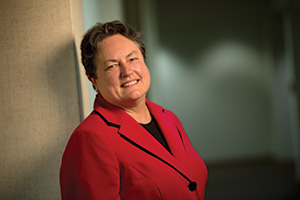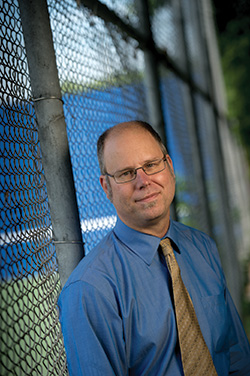Costly mistakes: Fight rages over who has burden of proving unemployment fraud
By: Erika Strebel, [email protected]//July 1, 2015//
Costly mistakes: Fight rages over who has burden of proving unemployment fraud
By: Erika Strebel, [email protected]//July 1, 2015//

After Megan Coronado lost three jobs in 2011, she thought the obvious next step was to file for unemployment benefits.
Four years later, she finds herself with little more than regrets after landing in the midst of a bureaucratic battle that may force her to pay back the benefits, as well as penalties and fees. If she’s unsuccessful, she’ll be on the hook for $14,000. It’s money she can ill afford to lose.
Coronado now makes $8.40 an hour from a part-time job at a Cost Cutters hair salon and shares a one-bedroom apartment in Waukesha with her 3-year-old son. If she could, Coronado says, she would return to school in the hope of finding a better way to make a living.
Yet, as a largely behind-the-scenes battle rages over the interpretation of a crucial state statute, the 26-year-old instead spends much of her free time trying to defend herself against charges of unemployment-insurance fraud. If found guilty of what the law deems “concealment,” she not only could be forced to pay the state about $14,000 but also would be debarred from collecting jobless benefits for six months.
Coronado is just one of dozens of benefits claimants whose fates have become intertwined in a bout over how far government officials should have to go to prove allegations of unemployment fraud. The biggest question is: Whose burden should it be to prove that misinformation was submitted by mistake, rather than as part of a deliberate attempt to defraud the state?
By and large, the disagreement comes down to the definition of concealment. According to state statute, concealment is an attempt “to intentionally mislead or defraud (the state) by withholding or hiding information or making a false statement or misrepresentation.” Claimants who are found in violation lose their ability to collect unemployment for half a year and must pay a penalty equal to 15 percent of their ill-gotten gains.
For many, the definition’s essential words are “to intentionally mislead or defraud.” Critics are now asserting that various state officials are pushing for a new interpretation that would do away with the need to prove intention. Claimants would instead find themselves having to overcome a presumption that misinformation had been submitted deliberately. To avoid paying back benefits, as well as various fees and fines, they would have to somehow prove that what they had turned in was in fact the result of a mere mistake.
Statute defines concealment
Coronado maintains that her dispute with the state originated in just that — a simple error arising from her not having understood instructions. When filling out reports she was required to submit every week in return for benefits. Coronado failed to grasp that she was really supposed to be listing her total income. She would instead report the difference between what she was actually making in a given week and what she would have been paid had she been working full-time.
The misinformation was submitted throughout the entire time that she was filing for unemployment. Years passed before she learned she had been doing anything wrong.
Compounding her troubles, Coronado has a learning disability, which she noted on her unemployment application. She can read, but she needs to go over words again and again before she can glean their meaning.
The disability led to her missing a deadline to appeal the state’s initial finding that she had violated the concealment statute.
“I’m not a malicious person,” Coronado said. “I’m not trying to steal from anybody. I don’t want to be stolen from. I wouldn’t want to steal from anybody. I just didn’t understand what was happening and that I was doing something wrong.”
She and her mother, Teresa Caporali, have turned to Victor Forberger, a lawyer in Madison, for help with further appeals.
Cashing in on ‘honest mistakes’

Forberger, who runs a clinic that helps unemployment claimants fight unfavorable decisions, said he noticed in 2013 that more and more people were calling in to complain that they were being accused of fraud. Most of them, he said, insisted they had done nothing more than make a mistake when filing for unemployment benefits.
In one extreme case, a client had taken the initiative on his own to bring an error to the attention of state officials. The unprompted admission did him little good, though.
The Department of Workforce Development — which manages the state’s unemployment system — pursued him for concealment. The case came to an end only when an administrative-law judge within the department decided that someone who had turned himself in could not possibly have been trying to defraud the state on purpose.
Brenda Lewison, a Milwaukee employment lawyer, has likewise noticed a telling increase in the number of concealment cases that have been coming her way. The frequency picked up particularly in the past 12 to 18 months, she said. Before that, Lewison said, concealment cases were so rare that she hadn’t litigated a single one since 1996.
Forberger said he thinks the DWD’s goal is to conserve the money that flows into the state’s unemployment fund, which is drawn on to pay out benefits. That money comes from employers, whose unemployment taxes rise when the fund dips low.
The greatest drop in recent memory came during the latest recession, when the fund went more than $1.7 billion into the red. As a result, employers found themselves having to pay higher taxes to cover federal loans made to ensure the state could continue paying unemployment benefits. Lawmakers, suddenly hit with a barrage of complaints, took notice.
The fund returned to solvency only late last year, helped in part by a new law requiring unemployment applicants to wait an extra week before claiming benefits and similar changes.
Forberger noted that the state’s disbursements have been going down — from about $2 billion in 2011 to about $730 million in 2014. He believes the fight against concealment will lead to even further decreases, largely because it will discourage the out-of-work from applying for unemployment benefits in the first place.
Redefining concealment

Not surprisingly, the crackdown on concealment has brought about a corresponding increase in the appeals filed by unemployment claimants who find themselves accused of the violation. The upshot has been a standoff pitting officials at the Department of Workforce Development against the Labor and Industry Review Commission, a body that someone can turn to in order to have an unfavorable unemployment decision overturned.
Officials on each side of the dispute accuse those on the other of abandoning their long-standing interpretations of the state’s concealment statute. Both, in turn, deny having budged an inch.
“We’re just doing what we’ve always been doing,” said Tracey Schwalbe, general counsel for the review commission, which is commonly known as LIRC.
Forberger and Lewison said that LIRC’s position has been consistent for decades. The Wisconsin Supreme Court, moreover, has held since 1959 that concealment cannot have occurred unless misinformation was submitted on purpose.
None of this has stopped the DWD from maintaining that it is the LIRC whose stance has changed. In an email statement, Janell Knutson, director of the DWD Unemployment Insurance Division’s Bureau of Legal Affairs, accused the commission of overstepping its authority.
“LIRC has essentially engaged in a policy debate on how much weight should be placed on an incorrect answer,” according to the email. “This policy decision should be determined by the (state’s unemployment advisory council) and Legislature.”
When the DWD disagrees with a LIRC decision, its first remedy is to appeal to the circuit courts. Hence the great increase seen in appeals in the past year or so.
DWD data show that administrative-law judges within the department found fraud to be present in 151 of the cases it heard in 2014. LIRC later knocked down most of those rulings, overturning a full 123. Those results, in turn, have led the DWD to file 10 appeals in circuit court.
LIRC has so far emerged triumphant in six of those cases and is waiting on decisions in two more. Only one has been remanded to the commission for further review.
Schwalbe sees the rulings in LIRC’s favor as affirming its interpretation of the concealment statute. DWD officials instead argue that they are losing many of the cases not because they have stumbled into a misinterpretation but because of the great deference the courts usually give to LIRC decisions.
Some lawmakers, such as state Rep. Chris Taylor, D-Madison, have tried to learn at recent state budget hearings how much the DWD has spent pursuing the cases in court. The only answer so far, she said, is that the cost is nearly impossible to determine because the appeals are considered part of staff lawyers’ normal duties and thus are not accounted for separately.
Stymied in its appeals attempts, the DWD is now moving beyond the circuit courts and is looking to state lawmakers. Legislation recently proposed by the department would seem to eliminate the state’s current obligation to provide evidence of intent when attempting to prove concealment.
The latest draft adds language stating that concealment “does not require an intent or design to receive benefits to which the claimant knows he or she is not entitled.” At the same time — in a step unlikely to clear up confusion — the statute would maintain that “conceal means to intentionally mislead.”
In another proposal that is riling critics, the change would prevent claimants from citing various specifics reasons to excuse the submission of misinformation. Among the defenses that could no longer be effectively invoked would be that inaccurate information had stemmed from a claimant’s inability to read or follow instructions or from advice provided by someone other than a DWD employee.
A draft version of the proposal was presented in May to an advisory panel charged with suggesting changes to the state’s unemployment-benefits policies. For the new language to take effect, it still must be approved by the full Legislature and signed by the governor.
The proposed change, according to comments made by the DWD attorney Andrew Rubsam at the advisory council’s May meeting, would establish a “rebuttable presumption that the claimant misled the department when providing the false information.”
Rubsam also noted that that the proposal would have a small, but beneficial effect on the state’s unemployment-insurance fund.
Schwalbe responded with a memo sent to the council April 9. In it, he expressed concerns that the proposed changes would, among other things, negate decades of the state’s common-law interpretation of concealment, lead to due-process troubles and expose claimants who had done nothing more than make a mistake to allegations of fraud.
Taking it to the Legislature
Current concealment statute: Wis. Stat. 108.04(11)(g)
(11) Fraudulent claims
(a) If a claimant, in filing his or her application for benefits or claim for any week, conceals any material fact relating to his or her eligibility for benefits, the claimant is ineligible for benefits as provided in par.
(b) If a claimant, in filing a claim for any week, conceals any of his or her wages earned or paid or payable or hours worked in that week, the claimant is ineligible for benefits as provided in par. (be).
If approved by the full Legislature and signed by Walker, the penalty amount would be made equal to 40 percent of a claimant’s gains, up from the current 15 percent.
At the same time, the committee deleted the governor’s suggestion to increase the criminal penalties that can be imposed on those found guilty of concealment.
In yet another swipe at LIRC, the committee approved a provision that would have more than $400,000 of the commission’s budget transferred to DWD for unemployment insurance “integrity purposes.” The change could put Schwalbe’s job at risk; if approved, the proposal would make the LIRC general counsel a direct appointee of the governor.
Although Forberger regularly appeals LIRC decisions, he finds the proposals alarming because they could sap the commission’s independence and deal a blow to LIRC’s legal team.
“I don’t want to be winning cases simply because LIRC doesn’t have the staffing,” Forberger said. “I want to win based on the merits of the argument, not because LIRC doesn’t have resources.”
To Forberger, the endgame is obvious: To erect as high a barrier as possible between claimants and the state’s unemployment fund.
The message has not been lost on Coronado. She said she has already resigned herself to the likelihood that she will end up paying the full $14,000 state officials say she owes to the unemployment fund. The DWD has already taken half of the money by withholding her latest tax refund, she said, and will probably get the rest from her 2015 refund.
She said her main goal now is to clear her name in circuit court.
“I will never file unemployment again,” she said. “I urge anybody anywhere, anytime: Do not file unemployment. Because even if it looks like a great thing and they’re supposed to be helping you, they won’t. And if you make one wrong step, they won’t even tell you. They’ll just try to take your money.”
2014 by the numbers
$732M
The amount of state and federal unemployment benefits paid in 2014
$20.4M
The amount overpaid in benefits from fraud in 2014
$1,569
The average overpayment owing to fraud in 2014
2.79
The percentage of 2014 total benefits paid that were fraudulent
13,034
Total number of fraud overpayment cases in 2014
Source: “Detection and Prevention of Fraud in the Unemployment Insurance Program: The Wisconsin Department of Workforce Development’s Annual Report to the Unemployment Insurance Advisory Council for Calendar Year 2014”, March 14, 2015
Legal News
- Former law enforcement praise state’s response brief in Steven Avery case
- Eric Toney announces re-election bid for Fond du Lac County District Attorney
- Former Wisconsin Democratic Rep. Peter Barca announces new bid for Congress
- Republicans file lawsuit challenging Evers’s partial vetoes to literacy bill
- More human remains believed those of missing woman wash up on Milwaukee Co. beach
- Vice President Harris returning to Wisconsin for third visit this year
- Wisconsin joins Feds, dozens of states to hold airlines accountable for bad behavior
- Trump ahead of Biden in new Marquette poll
- Bankruptcy court approves Milwaukee Marriott Downtown ‘business as usual’ motion
- New Crime Gun Intelligence Center to launch in Chicago
- Arrest warrant proposed for Minocqua Brewing owner who filed Lawsuit against Town of Minocqua
- Wisconsin Supreme Court justices question how much power Legislature should have
WLJ People
- Power 30 Personal Injury Attorneys – Russell Nicolet
- Power 30 Personal Injury Attorneys – Benjamin Nicolet
- Power 30 Personal Injury Attorneys – Dustin T. Woehl
- Power 30 Personal Injury Attorneys – Katherine Metzger
- Power 30 Personal Injury Attorneys – Joseph Ryan
- Power 30 Personal Injury Attorneys – James M. Ryan
- Power 30 Personal Injury Attorneys – Dana Wachs
- Power 30 Personal Injury Attorneys – Mark L. Thomsen
- Power 30 Personal Injury Attorneys – Matthew Lein
- Power 30 Personal Injury Attorneys – Jeffrey A. Pitman
- Power 30 Personal Injury Attorneys – William Pemberton
- Power 30 Personal Injury Attorneys – Howard S. Sicula











